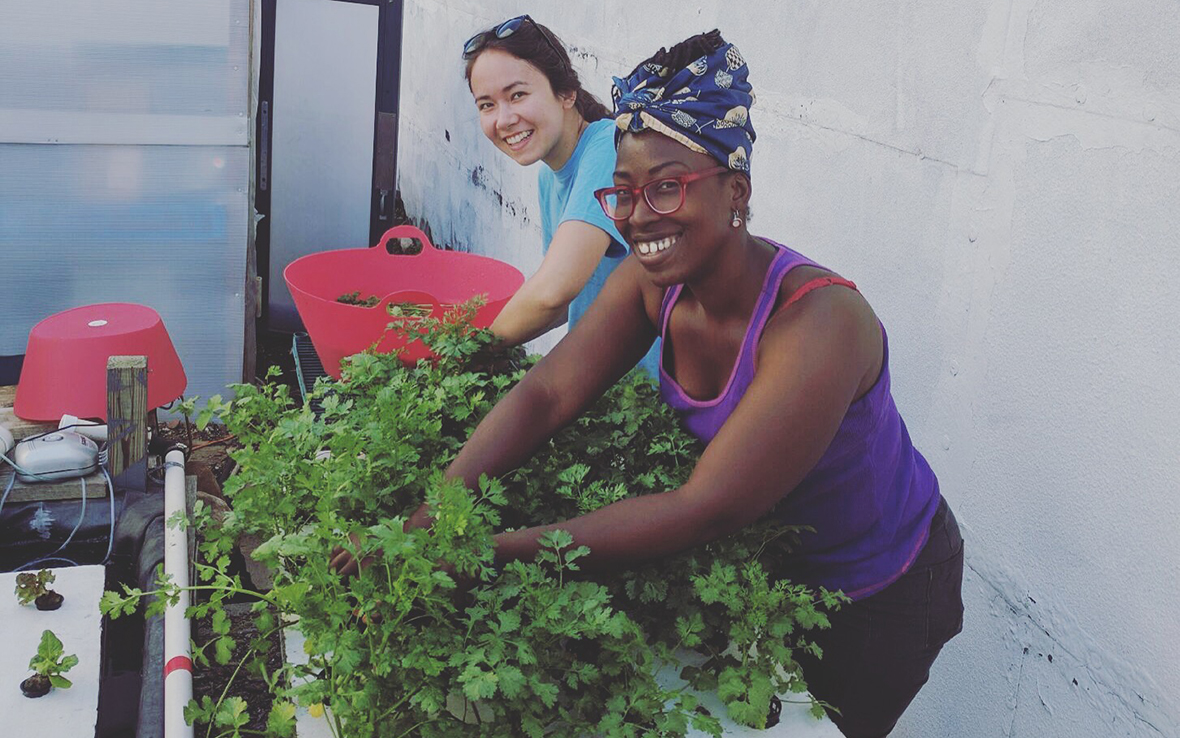Yemi is co-founder of the largest outdoor aquaponics farm in New York City, Oko Farms. In addition to directing all of Oko Farms' programs, she has facilitated the creation and maintenance of 20 edible spaces in at schools and community organizations in New York City. I didn't learn any of this from Yemi's interview - I had to go to the Oko Farms website to discover it. It's not that Yemi is holding back when she shares her story below, but it strikes me that some of her success comes from her ability to reflect, discover and share from the heart.
When did you know that you wanted to work in food?
My decision to work in food came when I was studying Ayurvedic Nutrition and began learning that the food we eat can also help us heal. At the time I was very focused on whether food made me fat or thin. Studying Ayurveda created a paradigm shift for me. I learned to think about food as something that nurtures, heals, and creates community. I knew that I wanted to share that knowledge with people and empower them to use food as a tool for nurturing and healing. I went on to get a Masters degree in Health and Nutrition education. My experience with Ayurveda directly influences my current work as a farmer, which is rooted in sharing knowledge about food and the environment.
How did you get your current good food job?
I created my job. I'm proud to be a Black, immigrant woman who owns and operates her own urban farm in New York City. Representation is important and necessary in the food movement. My goal is to inspire young people of color to positively influence the food system and to increase access to fresh, locally grown food in their communities.
How did your previous work or life experience prepare you for a good food job?
I've had several good food jobs as a chef, nutrition educator, farmers' market manager and farmer. I was lucky to have learned about agriculture in middle school in Lagos, Nigeria where I grew up. However, it was several years of battling with an eating disorder and body image issues that prepared me for my work. My search for healing helped me to discover my passion for cooking, farming and empowering people through food.
What was the greatest obstacle you had to overcome in pursuing your Good Food Job dream?
Farming is hard work. It can be both mentally and physically challenging. Urban farming has its unique challenges because of limited access to space, etc. There are definitely days I consider calling it quits. Today, I was speaking with one of the farm interns who shared with me that she's been thinking about the take-away from her experience at the farm and that the word "patience" keeps coming up for her. It takes a lot of patience and faith to farm organically and she believes that part of the reason that our food system is broken is because being patient can be difficult - especially if there's a risk of losing profit. That type of insight from a 19 year old college student is what keeps me going. That young lady is going to be an environmental leader someday and will carry her experience on the farm with her.
Name one positive thing that a former employer taught you that you continue to appreciate?
When I was working as an educator and farmers' market manager at a non-profit, I had a boss who was open to hearing my ideas and allowed me to take ownership of my work. That gave me confidence to express my creativity and made me value my contribution to the organization.
What can you identify as the greatest opportunities in food right now?
Urban farming has a tremendous amount of opportunities. It is creating avenues for African Americans, immigrants and other people of color to reconnect with the land and address food security in their communities.
If you could be compensated for your work with something other than money, what would it be?
Opportunities to travel and learn from innovative farmers around the world, especially those whose work is grounded in environmental sustainability and agro-ecology.









